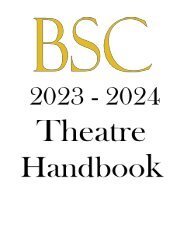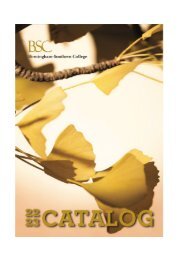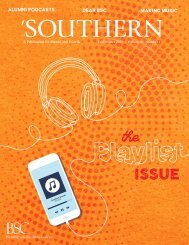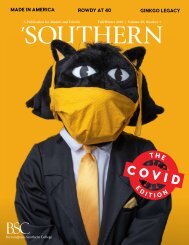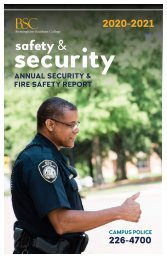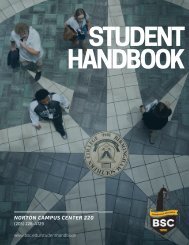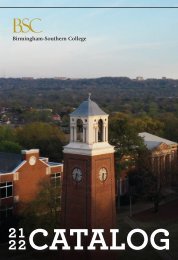Southern Fall/Winter 2022
A Publication for Alumni and Friends
A Publication for Alumni and Friends
Create successful ePaper yourself
Turn your PDF publications into a flip-book with our unique Google optimized e-Paper software.
P<br />
the ultimate insult was, ‘your mama wears army boots.’<br />
They were thinking, ‘Oh, our teacher wears army boots,<br />
and she’s a drill sergeant — she could kill people with<br />
her bare hands, so don’t mess with her!’ I never had any<br />
discipline issues,” she says, laughing.<br />
There were challenges to being a woman in the<br />
military.<br />
“When I first joined, female soldiers often were held<br />
to more traditional female roles. I was an administration<br />
and personnel officer. It was challenging because there<br />
was a pressure to prove you had the skills — it wasn’t<br />
explicit, but the unit withholds judgment until we prove<br />
to them that we are competent and capable of doing<br />
the job with them, unlike males going into a command<br />
position who are automatically accepted and believed to<br />
be competent by virtue of their gender. As a female, you<br />
had to walk that fine line of being assertive without being<br />
overly assertive. Certain actions that men would take<br />
— they’re praised for being assertive. If females were to<br />
take the same actions, we would be labeled aggressive.”<br />
She says it has improved over the years. “I think it’s<br />
wonderful that I can be the role model for all women<br />
to know that they can succeed to the highest levels of<br />
service in any organization.”<br />
Recently, Gordon met with National Guard leadership<br />
in Washington, D.C., to discuss the state partnership<br />
program, in which each state is partnered with a country<br />
in a different part of the world to work with them on<br />
improving their military up to NATO standards.<br />
“The state partnership program came about and<br />
started in 1993 after the dissolution of the Soviet<br />
Union,” she explains. “The former Eastern Bloc countries<br />
want to learn NATO and U.S. tactics.”<br />
Alabama National Guard is partnered with the<br />
country of Romania, which borders Ukraine.<br />
Gordon believes that mentorship is the most<br />
important aspect of her position, much in the same way<br />
that her own mentors throughout her life have helped<br />
her to succeed. Visiting troops where they are stationed<br />
is one of her favorite duties as the general.<br />
“We’re going to be celebrating our 30th anniversary<br />
with Romania next summer,” she says. “There are really<br />
a lot of similarities between being a teacher and what<br />
I do in the Guard, because you’re in charge of training<br />
and preparing them for a mission. I just love being out<br />
there seeing what the troops are doing, and hearing<br />
about what issues and challenges they are facing.<br />
They’ll be deployed over there for nine months; they’re<br />
leaving their families and their jobs. An important part<br />
of my job is to thank them and let them know that we<br />
back home are supporting their sacrifices. Also, I want<br />
them to know that we are taking care of their families<br />
while they are deployed, because the families make<br />
tremendous sacrifices as well.”<br />
“Birmingham-<strong>Southern</strong> College is different than many<br />
institutions in that it encourages a student’s involvement<br />
in many different circles across campus. I had the privilege<br />
of being able to serve as a leader in my fraternity, honor<br />
council, Quest II, orientation, and <strong>Southern</strong> Ambassadors.<br />
After leaving Birmingham-<strong>Southern</strong> and meeting peers<br />
from schools across the country, I learned that my level<br />
of involvement was rare. What’s funny is that it was not<br />
rare at Birmingham-<strong>Southern</strong>. The College encouraged<br />
and challenged individuals to give back to our peers and<br />
to our institution by becoming involved and serving as<br />
leaders in campus organizations. This kind of influence<br />
taught me a great deal about service and leadership, and it<br />
is something I am continuously grateful for. These lessons<br />
are perennially valuable for aspiring leaders after they<br />
graduate. Thank you, Birmingham-<strong>Southern</strong>, for giving<br />
your students the gift of involvement and leadership<br />
opportunities. We are better for it.”<br />
– Graham Spencer ’16, 2019 Rising Star Award Recipient,<br />
Principal at EAB, New York City<br />
FALL/WINTER <strong>2022</strong> / 29




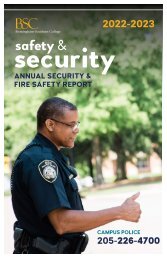
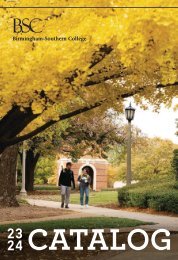
![2023-2024 BSC Catalog Updated_UG ONLY_FINAL[82]](https://img.yumpu.com/68414854/1/178x260/2023-2024-bsc-catalog-updated-ug-only-final82.jpg?quality=85)

